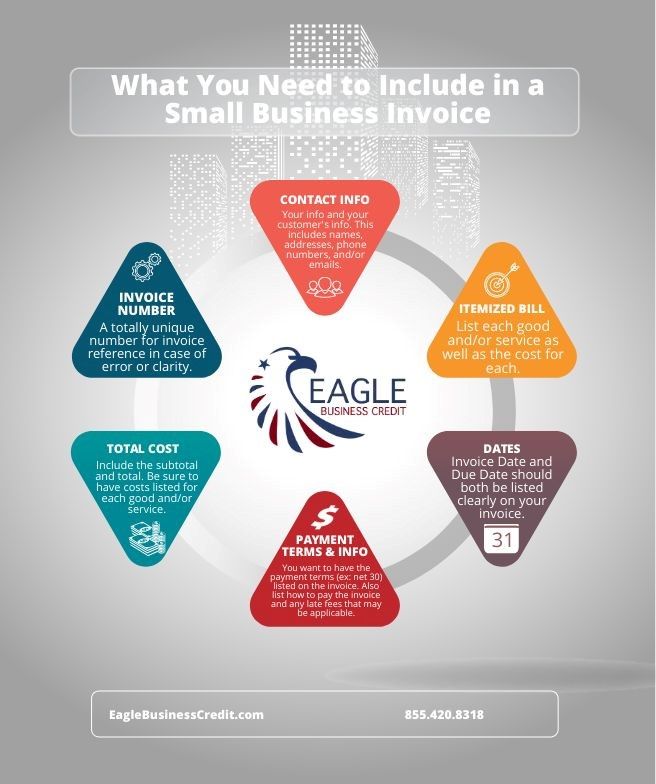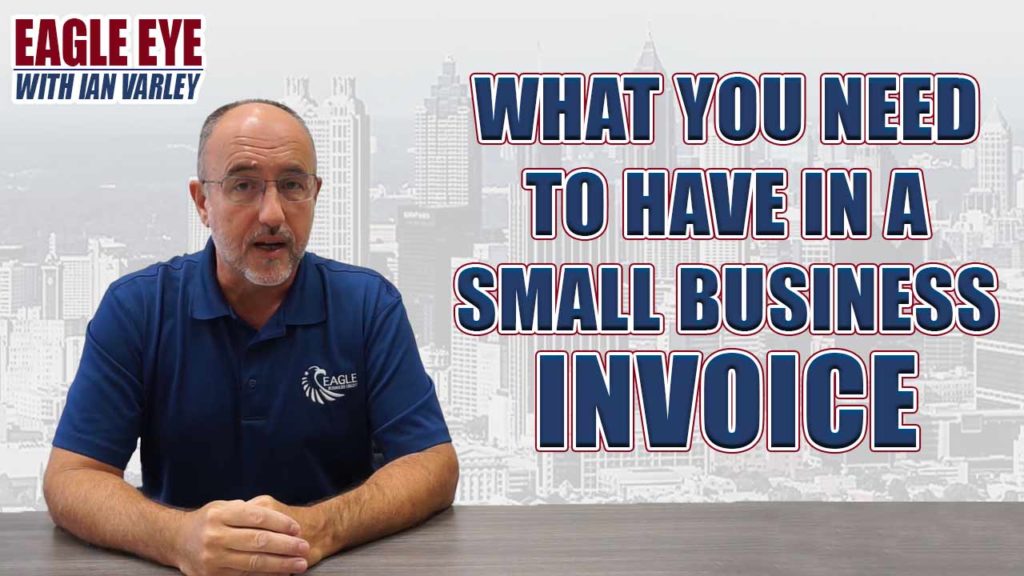When it comes to running a small business, you probably don’t think of invoices as the most important part. Small business invoicing is the key to getting paid for your work, and you need to include several components when making a small business invoice. Each of these components is essential in avoiding any opportunity for confusion or error in your customer’s payment. If you forget to include some of these invoice essentials, you run the risk of customer nonpayment. So, here is what you need to include in a small business invoice.
What You Need to Include in a Small Business Invoice:
- Your company contact information
- Your customer contact information
- Invoice number
- Itemized list of goods or services rendered
- Total cost
- Invoice date
- Payment information
- Payment due date
- Payment terms
Contact Information
The first component you absolutely need to include in your small business invoice is contact information. You want the contact information for both your company and for your customer. This means you need to have a name, phone number, address, website, and/or email on your invoice. List whatever contact information is reliable and applicable for your company. For example, you do not need to list your website if you don’t use your website for contacting customers. The reason why contact information is important is because if there is an issue in the invoicing process, you want your customer to be able to contact your company to resolve it. Further, you want to be able to contact your customer as well.
Including the contact information of your customer is also necessary. If, for some reason, your customer does not receive your small business invoice, having the specific contact information on the invoice itself can help you with a record of your invoicing process. Be sure to have a name written on the invoice. This will be your point of contact in discussing the invoice. Further, if there is an error in this information, your customer can fix that and ensure you both have the correct channels of communication open to each other.
Invoice Number
Each small business invoice should include an invoice number. This invoice number should be a unique number. Each invoice you send, even if it is to the same customer, should have a different invoice number. The purpose of including a unique invoice number on your invoice is for reference. You want to be able to look up an invoice by its unique number. This will save time if there is a problem in your invoicing, and it will help you if you ever need to check your invoicing history. Your customer will need this number in order to discuss the invoice they have received from you. So, if they want to discuss a specific good or service on an invoice, they can give you the invoice number. Then, everyone is referencing the correct invoice and can be on the same page when discussing the issue.
Itemized Billing
You do not want any surprises in your invoice. Write out an itemized list of what you are billing, whether it is for goods or services. You want your customer to look at your small business invoice and know exactly what and why they are paying your company. This list should include each good and service, as well as the specific cost of each. Honesty and transparency are good for business, and if there are any disputes in your billing, an itemized list will save time. This is crucial because you want to be paid as soon as possible for your work. So, if there is a mistake in your billing or the customer was unaware of a cost, an itemized list makes this process much clearer and easier to resolve.
The Total Cost
An itemized list of goods and services is important on your invoice. Further, you want to have the total invoice cost written. You want this number to be extremely clear and obvious. All of these invoice components are best practices to getting paid for your small business invoices on time. You want to clear up any opportunity for confusion or error in invoice payment. So, have the subtotal and grand total clearly designated on your invoices.
Invoice Date and Payment Terms
You should list the date of invoice delivery on your small business invoice. This is beyond important to include on your invoices because if you sell on credit terms, this date is when those terms start. Further, you need to have your payment terms written on the invoice. Some payment terms are from the date of the sale. Some are from the date of goods or services delivery. Your small business invoice should have the payment terms written that you and your customer agreed upon. If you sell on credit terms to your customer where payment is due 30 days from receipt of invoice, you should have that clearly written on the invoice. If there are any penalties for late payment, have that written here.
Due Date
Some business owners may assume that the invoice due date is redundant if you have the invoice date and payment terms written on it. You are partially correct. Yes, your customer can understand when the invoice payment is due by looking at the invoice date and payment terms. However, having this due date clearly stated will help ensure your customer pays on time. Further, if there are any issues in the timeliness of customer payment, having this due date on the invoice will enforce your case if you have penalties for late payment.
Payment Information
You want to make it easy to pay your business. Have you ever given up trying to pay a bill immediately because there were too many hoops to jump through? The quicker and easier it is to pay your small business invoice, the better results you will have in customer payment. Maybe your customer pays your invoice early because the process only took a minute or two. If the process takes too long, you risk late payment or nonpayment entirely. So, have directions to pay your invoice clearly written on the invoice.
If you send invoices electronically, have a hyperlink to the payment portal. If you mail physical invoices, have your payment address written down with specific instructions to make sure you don’t have to chase your customer to fix the payment. You could even have multiple payment options. Whatever payment method you accept, make sure the process is straightforward and simple.

Small Business Invoicing
At Eagle, we see invoices all day, every day. We consider ourselves to be invoice experts, and including these components is likely to get your invoice paid on time. As a factoring company, we purchase invoices from small business owners. We then wait the duration of payment terms, and we pay the small business immediately on day 1 for their invoice. If your invoicing process is taking up too much of your time, or if your receivables are past due, we can help. Invoice factoring improves cash flow and expedites the invoicing process.

